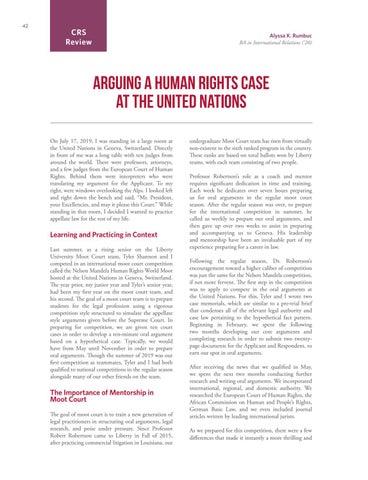42
CRS Review
Alyssa K. Rumbuc BA in International Relations (’20)
ARGUING A HUMAN RIGHTS CASE AT THE UNITED NATIONS On July 17, 2019, I was standing in a large room at the United Nations in Geneva, Switzerland. Directly in front of me was a long table with ten judges from around the world. There were professors, attorneys, and a few judges from the European Court of Human Rights. Behind them were interpreters who were translating my argument for the Applicant. To my right, were windows overlooking the Alps. I looked left and right down the bench and said, “Mr. President, your Excellencies, and may it please this Court.” While standing in that room, I decided I wanted to practice appellate law for the rest of my life.
Learning and Practicing in Context Last summer, as a rising senior on the Liberty University Moot Court team, Tyler Shannon and I competed in an international moot court competition called the Nelson Mandela Human Rights World Moot hosted at the United Nations in Geneva, Switzerland. The year prior, my junior year and Tyler’s senior year, had been my first year on the moot court team, and his second. The goal of a moot court team is to prepare students for the legal profession using a rigorous competition style structured to simulate the appellate style arguments given before the Supreme Court. In preparing for competition, we are given ten court cases in order to develop a ten-minute oral argument based on a hypothetical case. Typically, we would have from May until November in order to prepare oral arguments. Though the summer of 2019 was our first competition as teammates, Tyler and I had both qualified to national competitions in the regular season alongside many of our other friends on the team.
The Importance of Mentorship in Moot Court The goal of moot court is to train a new generation of legal practitioners in structuring oral arguments, legal research, and poise under pressure. Since Professor Robert Robertson came to Liberty in Fall of 2015, after practicing commercial litigation in Louisiana, our
undergraduate Moot Court team has risen from virtually non-existent to the sixth ranked program in the country. These ranks are based on total ballots won by Liberty teams, with each team consisting of two people. Professor Robertson’s role as a coach and mentor requires significant dedication in time and training. Each week he dedicates over seven hours preparing us for oral arguments in the regular moot court season. After the regular season was over, to prepare for the international competition in summer, he called us weekly to prepare our oral arguments, and then gave up over two weeks to assist in preparing and accompanying us to Geneva. His leadership and mentorship have been an invaluable part of my experience preparing for a career in law. Following the regular season, Dr. Robertson’s encouragement toward a higher caliber of competition was just the same for the Nelson Mandela competition, if not more fervent. The first step in the competition was to apply to compete in the oral arguments at the United Nations. For this, Tyler and I wrote two case memorials, which are similar to a pre-trial brief that condenses all of the relevant legal authority and case law pertaining to the hypothetical fact pattern. Beginning in February, we spent the following two months developing our core arguments and completing research in order to submit two twentypage documents for the Applicant and Respondent, to earn our spot in oral arguments. After receiving the news that we qualified in May, we spent the next two months conducting further research and writing oral arguments. We incorporated international, regional, and domestic authority. We researched the European Court of Human Rights, the African Commission on Human and People’s Rights, German Basic Law, and we even included journal articles written by leading international jurists. As we prepared for this competition, there were a few differences that made it instantly a more thrilling and
